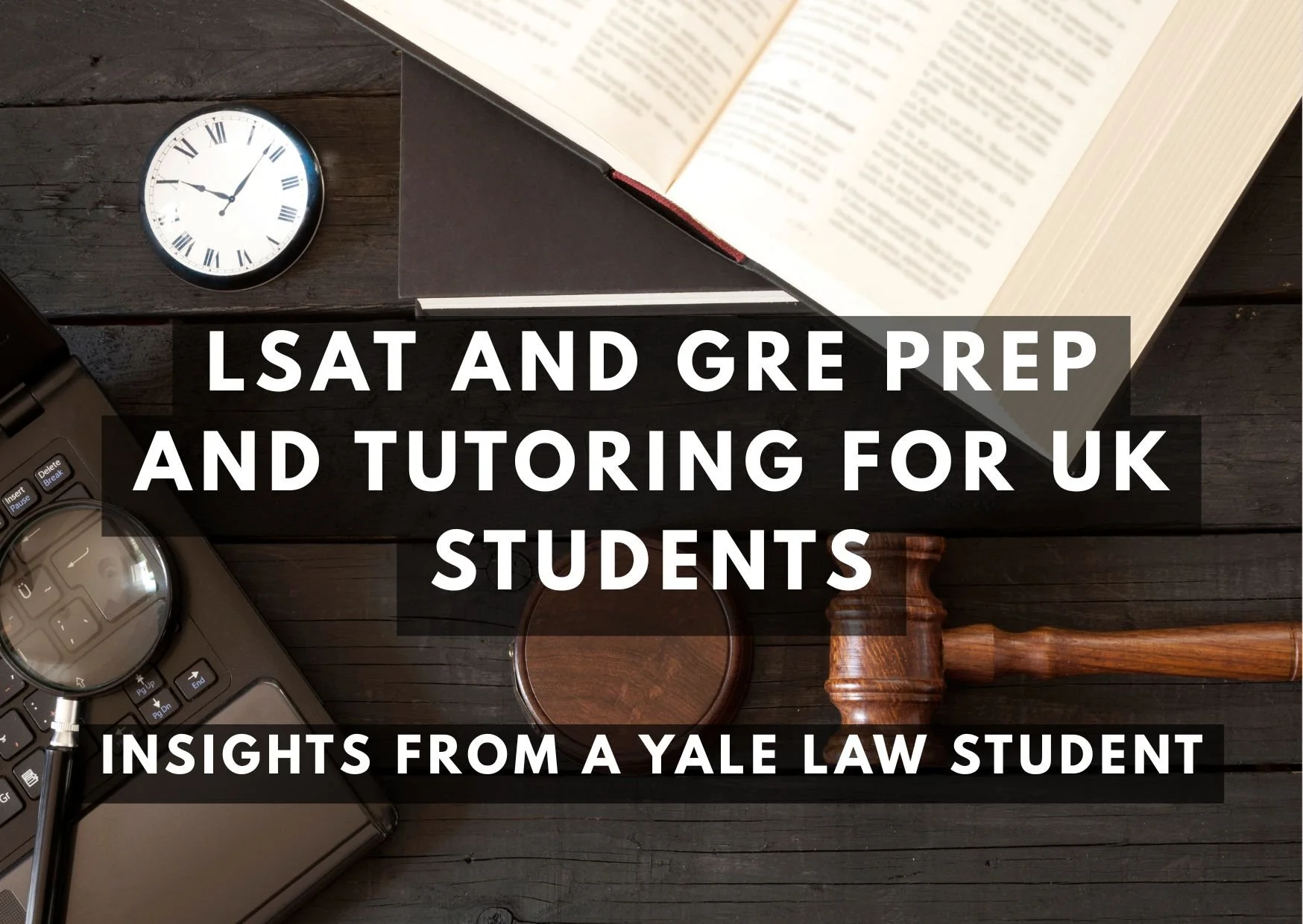LSAT and GRE Prep and Tutoring for UK Students: Insights from a Yale Law Student
US JD programs are typically three years long and open to students from all academic backgrounds, with no prior legal study required. The LSAT or, increasingly, the GRE are part of the application process. This guide covers all you need to know about preparation and revision, including insights from a Yale Law student.
Contents
What are the LSAT and GRE, and why do they matter?
UK Student-Specific JD Application Advice:
How to Approach Your LSAT or GRE Prep
Common Pitfalls and Myths to LSAT and GRE Prep
What are the LSAT and GRE, and why do they matter?
One key component of an application to US JD programmes is the LSAT or GRE.
The LSAT (Law School Admission Test) and GRE (Graduate Record Examinations) are standardised tests taken by students applying to postgraduate programs in the USA.
The LSAT is designed specifically for Law school applicants, but many institutions are increasingly accepting the GRE, a test designed for various programmes.
Most top law schools accept the GRE in place of the LSAT.
The GRE can be a good option for students who are stronger in math/verbal reasoning or are applying to dual-degree programs (e.g. JD/MPP, JD/MBA).
Crucially, the application process is holistic. It involves LSAT/GRE scores as well as undergraduate transcripts, personal statements, letters of recommendation, CVs, and sometimes supplemental or addendum statements.
US law schools, especially “T14” (top 14) schools, strongly emphasise academic potential, writing ability, and fit with institutional values.
The LSAT
Consists of four sections. The first three are multiple choice: Analytical Reasoning, Logical Reasoning, and Reading Comprehension. There’s also an essay section, though this section is not scored.
The LSAT is non-adaptive. The questions are of the same difficulty for all students.
It is primarily taken at home on your computer, though the UK has some in-person test centres.
The GRE
Consists of three sections: an analytical writing section and two multiple-choice sections on Verbal Reasoning and Quantitative Reasoning.
The GRE is adaptive. If you perform well, questions get harder.
Like the LSAT, it’s taken online and can be done at home or a test centre.
Uncertain whether to take the LSAT or GRE? Why not consult a tutor? Familiar with the courses and application process, they can offer tailored guidance on how to take and how best to prepare!
UK Student-Specific JD Application Advice:
Start early: the LSAT should be taken at least 6-9 months before applications open (target August or September LSAT).
Use your UK academic credentials to your advantage, but understand that US GPA conversion can be tricky (LSAC evaluations help).
US law schools appreciate global perspectives, so highlight your international experiences as a strength.
Many US JD programs value work experience or time taken off after your undergraduate degree. Gap years can be a strength, not a liability.
US schools love strong writers. Invest real time into a compelling personal statement beyond résumé bullet points.
Fit matters: US law schools (and universities in general) vary widely in culture, pedagogy, and community. Go beyond rankings and reflect on what kind of legal education and student environment suits you. A good “fit” doesn’t mean a perfect match. It can mean a place that will challenge and expand your perspective.
Train your referees!
UK teachers are often more understated in tone than US admissions readers expect.
A UK-style reference might say, “Sam has a strong understanding of the French language.” In contrast, a US-style letter might read, “Sam has an exceptional command of the French language and ranks among the top 5% of students I’ve taught in my 20-year career.”
Encourage your referees to be bold, specific, and comparative, and to comment not only on your academics but also on your character, leadership, and potential to contribute to a vibrant campus community.
If possible, share examples of US letters or explain how critical a strong, enthusiastic tone is in US admissions.
International students are eligible for financial aid at many schools (merit-based scholarships are more common than need-based), so consider applying!
How to Approach Your LSAT or GRE Prep
Practical Advice
The LSAT isn’t about memorisation; it’s a skills-based test, and most students underestimate the time needed to improve those skills.
A 170+ score isn’t a product of tricks; it’s about pattern recognition, time management, and internalising test logic.
Drilling the same Logical Reasoning questions (e.g., “weaken” or “strengthen”) across many tests helps you spot patterns and reduce decision time.
For Reading Comprehension, practice active annotation and learn to predict the structure and tone. This improves accuracy and speed.
Don’t skip the blind review: after finishing a timed section, return to the untimed and rethink every question. This is where real learning happens.
Success requires stamina: build up to complete five-section practice tests by training like an athlete, not just a student.
If you’re preparing for the GRE instead, focus on building vocabulary, timed quantitative drills, and practising analytical writing with real prompts.
Timeline & Strategy
Ideal prep timeline: 4-6 months (or 150-300 hours), starting with untimed learning, then move to timed drills, then complete practice tests.
Schedule 2-3 study blocks per week minimum (~10-15 hours/week) and build up to simulated complete exams under real conditions.
Take at least 15 full-length practice tests before your real test. Start with PrepTests 50-70, save 71-92 for later.
Focus on weak sections first. Don’t just retake tests over and over without reviewing why you’re missing questions.
If preparing for the GRE instead, plan a 2-4 month prep window if you’re already familiar with the test or a 4-6 month window if starting from scratch.
Common Pitfalls and Myths to LSAT and GRE Prep
“Is 170 enough for Harvard?” → Not necessarily. Harvard denies many 170+ scorers and sometimes admits students with lower scores. Scores are only part of the picture.
“LSAT is just memorisation” → False. It’s logic training. You can’t memorise your way to a top score.
“You only need 2-3 months to prep” → Not for most. Many students take 4-6 months or more, especially with full-time jobs or school.
“The LSAT is easier than the GRE” → Not true if you don’t have formal logic or reading-heavy backgrounds. It tests skills not taught in school.
“Tutoring is a last resort” → Starting with a tutor often saves time and frustration.
“Top law schools that accept the GRE still prefer the LSAT” → False. Schools like Yale and Harvard have publicly stated that they evaluate GRE and LSAT scores equally. They care more about overall academic potential than which test you took.
Is LSAT or GRE Tutoring Worth It?
Most definitely! Personalised instruction speeds up the learning curve.
Tutors can help structure a realistic study plan tailored to your schedule, goals, and weaknesses.
One-on-one guidance prevents wasted time on ineffective methods and ensures accountability.
High-quality tutors offer insights into app strategy, personal statements, and how to hit target score increases.
LSAT tutoring is especially useful if you’re plateauing around 155-165 and want to break into the 170+ range.
To learn more about how U2 Tuition can support your J.D. Law application, book a complimentary 20-minute consultation. We’ve got the expert LSAT and GRE tutors to help you succeed. Let them curate your bespoke preparation schedule.
FAQs: UK Students & the LSAT/GRE
Is there an LSAT or GRE in the UK?
Yes, both tests can be taken in the UK.
Is the LSAT the same as the LNAT?
No. The LSAT is for Law schools in the USA, whilst the LNAT is for programs in the UK.
Where can I access past papers?
LSAC’s LawHub offers official practice tests. Khan Academy and other sites also provide access. Our tutors can provide resources and advise on what to use.
What’s a good LSAT score for top schools?
A 170+ is typically competitive for T14 schools, but 165-169 may suffice with strong applications.
Should I pay for LSAT tutoring?
If you’re aiming for T14 schools, it’s worth the investment, especially if you’re self-studying inefficiently.
Can I self-study?
Yes, but it requires discipline, resources, and consistent review. Many start with free materials before deciding whether they need extra support.
Can I take the LSAT at home?
You can take it online or in person at a test centre. Online testing requires downloading the proctoring software.
Do schools accept the GRE instead of the LSAT?
Yes, most top schools do, but always double-check their policies. GRE scores are valid for 5 years.
Should I take the GRE and the LSAT?
This is rarely necessary. Choose the test that better fits your strengths and law school list, but prep thoroughly either way.
What is the average LSAT score?
The average LSAT score is around 152.
How long should I study for the LSAT?
Ideally, 4-6 months, the equivalent of 150-300 hours.





